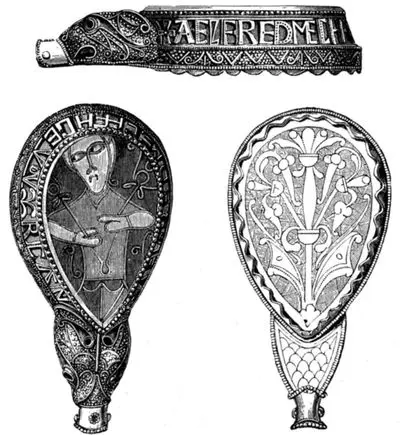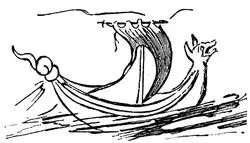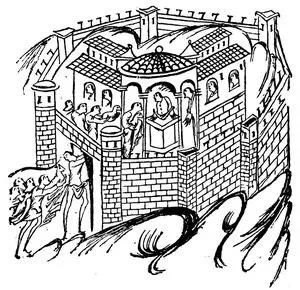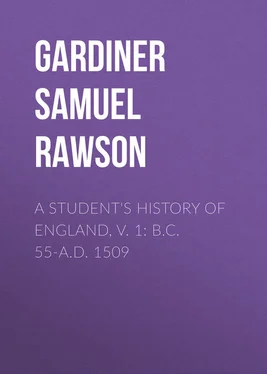Samuel Gardiner - A Student's History of England, v. 1 - B.C. 55-A.D. 1509
Здесь есть возможность читать онлайн «Samuel Gardiner - A Student's History of England, v. 1 - B.C. 55-A.D. 1509» — ознакомительный отрывок электронной книги совершенно бесплатно, а после прочтения отрывка купить полную версию. В некоторых случаях можно слушать аудио, скачать через торрент в формате fb2 и присутствует краткое содержание. Издательство: Иностранный паблик, Жанр: foreign_prose, История, foreign_antique, на английском языке. Описание произведения, (предисловие) а так же отзывы посетителей доступны на портале библиотеки ЛибКат.
- Название:A Student's History of England, v. 1: B.C. 55-A.D. 1509
- Автор:
- Издательство:Иностранный паблик
- Жанр:
- Год:неизвестен
- ISBN:нет данных
- Рейтинг книги:5 / 5. Голосов: 1
-
Избранное:Добавить в избранное
- Отзывы:
-
Ваша оценка:
- 100
- 1
- 2
- 3
- 4
- 5
A Student's History of England, v. 1: B.C. 55-A.D. 1509: краткое содержание, описание и аннотация
Предлагаем к чтению аннотацию, описание, краткое содержание или предисловие (зависит от того, что написал сам автор книги «A Student's History of England, v. 1: B.C. 55-A.D. 1509»). Если вы не нашли необходимую информацию о книге — напишите в комментариях, мы постараемся отыскать её.
A Student's History of England, v. 1: B.C. 55-A.D. 1509 — читать онлайн ознакомительный отрывок
Ниже представлен текст книги, разбитый по страницам. Система сохранения места последней прочитанной страницы, позволяет с удобством читать онлайн бесплатно книгу «A Student's History of England, v. 1: B.C. 55-A.D. 1509», без необходимости каждый раз заново искать на чём Вы остановились. Поставьте закладку, и сможете в любой момент перейти на страницу, на которой закончили чтение.
Интервал:
Закладка:
5. Ælfred's Struggle in Wessex. 871—878.—In Wessex Æthelred strove hard against the invaders. He won a great victory at Æscesdun ( Ashdown , near Reading), on the northern slope of the Berkshire Downs. After a succession of battles he was slain in 871. Though he left sons of his own, he was succeeded by Ælfred, his youngest brother. It was not the English custom to give the crown to the child of a king if there was any one of the kingly family more fitted to wear it. Ælfred was no common man. In his childhood he had visited Rome, and had been hallowed as king by Pope Leo IV., though the ceremony could have had no weight in England. He had early shown a love of letters, and the story goes that when his mother offered a book with bright illuminations to the one of her children who could first learn to read it, the prize was won by Ælfred. During Æthelred's reign he had little time to give to learning. He fought nobly by his brother's side in the battles of the day, and after he succeeded him he fought nobly as king at the head of his people. In 878the Danish host, under its king, Guthrum, beat down all resistance. Ælfred was no longer able to keep in the open country, and took refuge with a few chosen warriors in the little island of Athelney, in Somerset, then surrounded by the waters of the fen country through which the Parret flowed. After a few weeks he came forth, and with the levies of Somerset and Wilts and of part of Hants he utterly defeated Guthrum at Ethandun (? Edington , in Wiltshire), and stormed his camp.

Gold jewel of Ælfred found at Athelney. (Now in the Ashmolean Museum, Oxford.)
6. The Treaty of Chippenham, and its Results. 878.—After this defeat Guthrum and the Danes swore to a peace with Ælfred at Chippenham. They were afterwards baptised in a body at Aller, not far from Athelney. Guthrum with a few of his companions then visited Ælfred at Wedmore, a village near the southern foot of the Mendips, from which is taken the name by which the treaty is usually but wrongly known. By this treaty Ælfred retained no more than Wessex, with its dependencies, Sussex and Kent, and the western half of Mercia. The remainder of England as far north as the Tees was surrendered to the Danes, and became known as the Danelaw, because Danish and not Saxon law prevailed in it. Beyond the Tees Bernicia maintained its independence under an English king. Though the English people never again had to struggle for its very existence as a political body, yet, in 886, after a successful war, Ælfred wrung from Guthrum a fresh treaty by which the Danes surrendered London and the surrounding district. Yet, even after this second treaty, it might seem as if Ælfred, who only ruled over a part of England, was worse off than his grandfather, Ecgberht, who had ruled over the whole. In reality he was better off. In the larger kingdom it would have been almost impossible to produce the national spirit which alone could have permanently kept the whole together. In the smaller kingdom it was possible, especially as there was a strong West Saxon element in the south-west of Mercia in consequence of its original settlement by a West Saxon king after the battle of Deorham (see p. 35). Moreover, Ælfred, taking care not to offend the old feeling of local independence which still existed in Mercia, appointed his son-in-law, Æthelred, who was a Mercian, to govern it as an ealdorman under himself.

An English vessel. (Harl. MS. 603.)
7. Ælfred's Military Work.—Ælfred would hardly have been able to do so much unless his own character had been singularly attractive. Other men have been greater warriors or legislators or scholars than Ælfred was, but no man has ever combined in his own person so much excellence in war, in legislation, and in scholarship. As to war, he was not only a daring and resolute commander, but he was an organiser of the military forces of his people. One chief cause of the defeats of the English had been the difficulty of bringing together in a short time the 'fyrd,' or general levy of the male population, or of keeping it long together when men were needed at home to till the fields. Ælfred did his best to overcome this difficulty by ordering that half the men of each shire should be always ready to fight, whilst half remained at home. This new half-army, like his new half-kingdom, was stronger than the whole one had been before. To an improved army Ælfred added a navy, and he was the first English king who defeated the Danes at sea.

A Saxon house. (Harl. MS. 603.)
8. His Laws and Scholarship.—Ælfred was too great a man to want to make every one conform to some ideal of his own choosing. It was enough for him to take men as they were, and to help them to become better. He took the old laws and customs, and then, suggesting a few improvements, submitted them to the approval of his Witenagemot, the assembly of his bishops and warriors. He knew also that men's conduct is influenced more by what they think than by what they are commanded to do. His whole land was steeped in ignorance. The monasteries had been the schools of learning; and many of them had been sacked by the Danes, their books burnt, and their inmates scattered, whilst others were deserted, ceasing to receive new inmates because the first duty of Englishmen had been to defend their homes rather than to devote themselves to a life of piety. Latin was the language in which the services of the Church were read, and in which books like Bede's Ecclesiastical History were written. Without a knowledge of Latin there could be no intercourse with the learned men of the Continent, who used that language still amongst themselves. Yet when the Danes departed from Ælfred's kingdom, there were but very few priests who could read a page of Latin. Ælfred did his best to remedy the evil. He called learned men to him wherever they could be found. Some of these were English; others, like Asser, who wrote Ælfred's life, were Welsh; others again were Germans from beyond the sea. Yet Ælfred was not content. It was a great thing that there should be again schools in England for those who could write and speak Latin, the language of the learned, but his heart yearned for those who could not speak anything but their own native tongue. He set himself to be the teacher of these. He himself translated Latin books for them, with the object of imparting knowledge, not of giving, as a modern translator would do, the exact sense of the author. When, therefore, he knew anything which was not in the books, but which he thought it good for Englishmen to read, he added it to his translation. Even with this he was not content. The books of Latin writers which he translated taught men about the history and geography of the Continent. They taught nothing about the history of England itself, of the deeds and words of the men who had ruled the English nation. That these things might not be forgotten, he bade his learned men bring together all that was known of the history of his people since the day when they first landed as pirates on the coast of Kent. The Chronicle, as it is called, is the earliest history which any European nation possesses in its own tongue. Yet, after all, such a man as Ælfred is greater for what he was than for what he did. No other king ever showed forth so well in his own person the truth of the saying, 'He that would be first among you, let him be the servant of all.'
Читать дальшеИнтервал:
Закладка:
Похожие книги на «A Student's History of England, v. 1: B.C. 55-A.D. 1509»
Представляем Вашему вниманию похожие книги на «A Student's History of England, v. 1: B.C. 55-A.D. 1509» списком для выбора. Мы отобрали схожую по названию и смыслу литературу в надежде предоставить читателям больше вариантов отыскать новые, интересные, ещё непрочитанные произведения.
Обсуждение, отзывы о книге «A Student's History of England, v. 1: B.C. 55-A.D. 1509» и просто собственные мнения читателей. Оставьте ваши комментарии, напишите, что Вы думаете о произведении, его смысле или главных героях. Укажите что конкретно понравилось, а что нет, и почему Вы так считаете.












